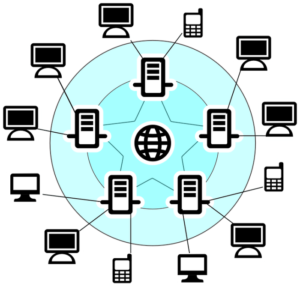
Remote sales management is revolutionizing how businesses operate in today’s digital age, allowing teams to connect and collaborate from anywhere in the world. As organizations shift towards remote working models, understanding the nuances of managing sales teams outside a traditional office setting has become essential for driving success.
This approach not only addresses the logistical and operational challenges of remote work but also opens up opportunities for innovation, international collaboration, and enhanced productivity. By embracing new technologies and strategies, companies can effectively navigate the complexities of remote sales management.
Understanding Remote Sales Management
Remote sales management has gained prominence in today’s digital-first business landscape. As companies increasingly transition to remote operations, effectively managing sales teams from a distance has become crucial. This concept involves overseeing sales activities and representatives who work from various locations instead of a centralized office. The significance lies in enabling organizations to tap into global talent pools, reduce overhead costs, and maintain business continuity amidst uncertainties.However, managing remote sales teams comes with its own set of challenges.
Communication barriers, team cohesion, and performance monitoring are common pain points that can affect productivity and morale. To overcome these obstacles, companies should implement regular check-ins, utilize collaboration tools, and foster an inclusive virtual culture.
Challenges and Solutions
Remote sales teams encounter several challenges, including:
- Communication Issues: Without face-to-face interactions, miscommunications are more likely to occur.
- Lack of Team Cohesion: Building relationships can be difficult in a virtual environment.
- Performance Tracking: Measuring productivity and sales performance requires different strategies than traditional methods.
To address these issues, companies have successfully adopted strategies such as implementing daily stand-up meetings, utilizing project management software, and organizing virtual team-building exercises.
Business Innovation in Remote Sales
Innovation is imperative for remote sales teams to stay competitive. The use of cutting-edge tools and technologies can streamline sales processes, enhance customer relationship management, and improve data analysis. By embracing innovative solutions, companies can not only boost efficiency but also enhance the customer experience.
Innovative Tools and Technologies
Some of the most impactful tools include:
- CRM Platforms: Tools like Salesforce provide comprehensive customer insights.
- Video Conferencing Software: Zoom or Microsoft Teams facilitate face-to-face interactions remotely.
- Collaboration Tools: Platforms like Slack improve team communication and coordination.
Fostering a culture of innovation within remote sales teams is also crucial. Encouraging team members to share ideas and experiment with new approaches can lead to significant breakthroughs.
International Business and Remote Sales
Remote sales management has a profound impact on international markets. As geographical barriers diminish, companies can expand their reach and sell to customers across the globe. However, this expansion comes with its own set of complexities.
Cultural Considerations in Remote Sales
When managing remote sales teams across different cultural contexts, it’s vital to adapt strategies accordingly. Different cultures have varying communication styles, work ethics, and customer expectations. Companies must:
- Embrace Diversity: Recognizing the strengths that diverse teams bring can enhance creativity and problem-solving.
- Tailor Approaches: Customizing sales pitches and marketing strategies to fit local preferences is essential.
- Stay Informed: Understanding local regulations and compliance requirements is critical for success.
Legal and regulatory considerations also play a significant role in shaping remote sales strategies in global markets. Companies need to remain compliant with the laws of each region they operate in, which may affect pricing, contracts, and customer interactions.
Conducting Business Interviews Remotely
The recruitment process for remote sales positions requires a tailored approach to assess candidates effectively. Conducting thorough interviews is essential to ensure that new hires align with the company’s culture and possess the necessary skills for remote work.
Best Practices for Remote Interviews
To conduct effective remote interviews, companies should:
- Prepare Structured Questions: Having a clear set of questions helps maintain focus during the interview.
- Assess Technical Skills: Use role-play scenarios to evaluate candidates’ sales skills.
- Evaluate Remote Work Capabilities: Inquire about past experiences in remote settings and how candidates managed their productivity.
Incorporating technology to facilitate interviews, such as screen sharing and real-time assessments, can provide valuable insights into a candidate’s capabilities.
Job Search Techniques for Remote Sales Roles
For job seekers looking to enter the remote sales field, employing effective strategies is crucial to stand out in a competitive market.
Finding Opportunities
Strategies to locate remote sales positions include:
- Utilizing Job Boards: Websites dedicated to remote work offer a wealth of opportunities.
- Networking Online: Engaging on platforms like LinkedIn can open doors to referrals and hidden job markets.
- Tailoring Applications: Customizing resumes and cover letters to highlight relevant remote work skills catches the attention of employers.
Leveraging online platforms and communities can significantly enhance networking efforts, leading to more opportunities in the remote sales arena.
Business Management in Remote Sales Contexts
Effective management of remote sales teams is critical for ensuring high performance. Leaders in remote settings must adopt new approaches to engage and motivate their teams.
Key Management Elements
Essential elements of managing remote sales teams include:
- Clear Communication: Establishing communication protocols ensures everyone is aligned.
- Performance Metrics: Tracking KPIs specific to remote work helps gauge success and areas for improvement.
- Collaboration Tools: Utilizing shared platforms enhances teamwork and accountability.
Fostering collaboration among remote sales staff is essential for building trust and achieving common goals.
Marketing Direct and Remote Sales
Adapting direct marketing strategies for remote sales is vital for reaching potential customers effectively.
Integrating Direct Marketing
To integrate direct marketing into remote sales strategies, companies should:
- Utilize Digital Channels: Leverage email campaigns and social media for targeted outreach.
- Personalize Communications: Tailoring messages to individual customer needs increases engagement.
- Measure Effectiveness: Analyzing campaign performance helps refine strategies for better results.
Digital marketing plays a significant role in supporting remote sales efforts, providing insights and enhancing outreach.
Business Networking for Remote Sales Professionals
Networking remains a cornerstone of success in remote sales, despite physical distances.
Building Relationships Remotely
Effective networking in a remote sales environment can be achieved through:
- Online Professional Groups: Joining industry-related forums can foster connections.
- Virtual Networking Events: Participating in webinars and online meetups expands professional circles.
- Follow-Up Practices: Sending personalized messages post-event strengthens relationships.
Building and maintaining relationships is essential for long-term success in remote sales.
Business Outsourcing in Sales
Outsourcing certain sales functions can provide strategic advantages, but it also comes with risks.
Benefits and Risks of Outsourcing
The decision to outsource sales functions should consider:
- Cost Savings: Outsourcing can reduce operational costs significantly.
- Access to Expertise: Partnering with specialized firms can enhance sales effectiveness.
- Potential Risks: Managing quality control and ensuring alignment with brand values are critical challenges.
Identifying the right outsourcing partners and establishing clear expectations is vital for successful collaboration.
Business Presentations in a Remote Setting
Delivering impactful sales presentations remotely requires a different set of skills and tools.
Guidelines for Remote Presentations
Effective remote sales presentations should include:
- Engaging Content: Presentations should be visually appealing and informative.
- Interactive Elements: Incorporating polls and Q&A sessions keeps the audience engaged.
- Utilizing Technology: Tools like PowerPoint or Prezi can enhance visual storytelling.
Engaging an audience effectively in virtual presentations is crucial for successful sales outcomes.
Enhancing Business Productivity in Remote Sales
Improving productivity among remote sales teams is paramount for achieving business objectives.
Productivity Tools and Methods
Identifying productivity tools can help remote teams function optimally:
- Time Management Apps: Tools like Trello or Asana can help track tasks and deadlines.
- Sales Automation Software: Automating repetitive tasks allows sales reps to focus on relationships.
- Goal Setting Techniques: Establishing SMART goals helps maintain clarity and direction.
Sharing case studies of companies that improved productivity through these strategies can provide valuable insights.
Sales Management Techniques for Remote Teams

Managing remote sales representatives requires specific techniques to ensure team effectiveness.
Essential Management Skills
Sales leaders should focus on developing key skills such as:
- Empathy: Understanding team members’ challenges fosters a supportive environment.
- Adaptability: Being flexible in management approaches can help address unique team needs.
- Coaching: Providing ongoing training and support enhances sales capabilities.
Implementing effective team leadership practices creates a motivated and high-performing sales team.
Risk Management in Remote Sales
Identifying and mitigating risks is essential for maintaining smooth remote sales operations.
Potential Risks and Mitigation Strategies
Common risks associated with remote sales include:
- Data Security: Cyber threats can compromise sensitive customer information.
- Performance Variability: Inconsistent productivity levels can lead to missed targets.
- Legal Compliance: Failure to follow regulations can result in penalties.
Developing a risk management framework that includes regular audits and training can help mitigate these risks.
Sales Teleselling Strategies
Teleselling remains an effective sales technique in remote environments, requiring specific strategies.
Teleselling Techniques for Remote Sales
Key teleselling strategies include:
- Active Listening: Understanding customer needs is crucial for effective selling over the phone.
- Personalization: Tailoring pitches to individual clients increases conversion rates.
- Follow-Up Calls: Regular check-ins can build rapport and trust with clients.
Successful teleselling campaigns often rely on clear communication skills and persistent follow-up efforts.
Importance of Sales Training for Remote Teams
Comprehensive training programs are essential for equipping remote sales representatives with the necessary skills.
Designing Effective Training Programs
Key components of a successful training program include:
- Blended Learning Approaches: Combining online modules with live sessions enhances learning retention.
- Role-Playing Exercises: Simulating real-life sales scenarios prepares reps for actual interactions.
- Ongoing Support: Providing access to resources and mentorship ensures continuous development.
Offering resources for ongoing education helps remote sales teams stay updated on industry trends.
Business Security in Remote Sales
Security challenges are unique to remote sales environments, requiring vigilant practices.
Ensuring Data Privacy and Security
Best practices for maintaining security include:
- Regular Training: Educating team members on security protocols is crucial.
- Using Secure Platforms: Employing encrypted communication tools protects sensitive information.
- Monitoring Access: Controlling access to data and systems minimizes security risks.
Creating a robust security protocol is vital for protecting both company and customer data.
Small Business and Remote Sales
Small businesses often face unique challenges in managing remote sales teams.
Optimizing Remote Sales Efforts
Strategies for small businesses to enhance their remote sales efforts include:
- Leveraging Technology: Utilizing affordable tools can streamline processes.
- Building Strong Relationships: Personal connections with customers can lead to loyalty.
- Continuous Feedback: Regularly seeking feedback from customers can improve services.
Implementing a checklist for effective remote sales practices can aid small businesses in achieving their goals.
Solo Professionals in Remote Sales
Solo professionals in remote sales encounter distinct advantages and challenges.
Managing Time Effectively
Tips for solo sales professionals include:
- Creating a Schedule: A structured routine helps maintain focus and productivity.
- Utilizing Tools: Time management apps can assist in staying organized.
- Networking Strategies: Engaging with other professionals expands opportunities for collaboration.
Building connections remotely can be achieved through online platforms and social media engagement.
Strategic Planning for Remote Sales
Developing a strategic plan is essential for effective remote sales management.
Aligning Sales Strategies with Business Goals
Components of a strategic plan for remote sales teams should include:
- Clearly Defined Objectives: Setting specific, measurable goals provides direction.
- Regular Reviews: Periodic evaluations of strategy effectiveness help identify areas for improvement.
- Feedback Mechanisms: Collecting input from team members ensures alignment with overall business goals.
Successful strategic planning in remote sales contexts relies on clear communication and collaboration.
Team Building for Remote Sales Teams
Fostering team cohesion in remote sales environments is vital for overall success.
Enhancing Team Bonding
Techniques to improve team bonding include:
- Virtual Social Events: Organizing casual online gatherings strengthens relationships.
- Collaborative Projects: Working together on initiatives fosters teamwork.
- Recognition Programs: Celebrating achievements boosts morale and engagement.
Measuring team performance and engagement can be accomplished through regular surveys and feedback sessions.
Venture Capital and Remote Sales

Understanding how venture capital firms evaluate remote sales teams is crucial for startups seeking funding.
Evaluating Remote Sales Performance
Factors considered by venture capitalists include:
- Team Dynamics: Assessing the strength and cohesion of the sales team is essential.
- Market Potential: Evaluating the scalability and growth potential of sales strategies.
- Track Record: Reviewing past sales performance helps gauge future success.
Remote sales teams seeking venture capital investment should focus on demonstrating their effectiveness and market viability.
Workplace Communication in Remote Sales
Effective communication is the backbone of successful remote sales operations.
Enhancing Communication Among Teams
Tools and practices to improve communication include:
- Instant Messaging Platforms: Tools like Slack facilitate quick communication.
- Regular Check-Ins: Weekly meetings can align team members with current goals.
- Clear Protocols: Establishing guidelines for communication ensures everyone is informed.
Managing communication challenges requires a proactive approach to foster transparency and collaboration.
Workplace Safety in Remote Sales
Maintaining the mental and physical well-being of remote sales personnel is critical.
Creating a Safe Remote Work Environment
Tips for ensuring safety and wellness include:
- Promoting Work-Life Balance: Encouraging breaks and time off helps prevent burnout.
- Providing Resources: Offering access to mental health resources supports employee well-being.
- Encouraging Open Dialogue: Creating a culture where team members feel comfortable discussing challenges enhances support.
Resources for supporting the well-being of remote sales personnel should be readily available to foster a healthy work environment.
Conclusion
In summary, mastering remote sales management is crucial for businesses aiming to thrive in a competitive landscape. By implementing effective strategies and fostering a culture of communication and innovation, teams can overcome challenges and achieve remarkable results, setting the stage for sustainable growth in the future.
Questions Often Asked
What are the benefits of remote sales management?
Remote sales management offers flexibility, access to a wider talent pool, and the ability to leverage digital tools for efficiency.
How can I keep my remote sales team motivated?
Maintaining motivation in a remote sales team can be achieved through regular check-ins, recognition programs, and fostering a sense of community.
What technologies are essential for remote sales teams?
Key technologies include customer relationship management (CRM) software, video conferencing tools, and project management platforms to facilitate communication and collaboration.
How can I ensure effective communication among remote sales staff?
Establishing clear communication protocols and using collaboration tools can help ensure that remote sales teams stay connected and informed.
What are some common challenges in remote sales management?
Common challenges include maintaining team cohesion, managing performance metrics, and addressing communication barriers.





